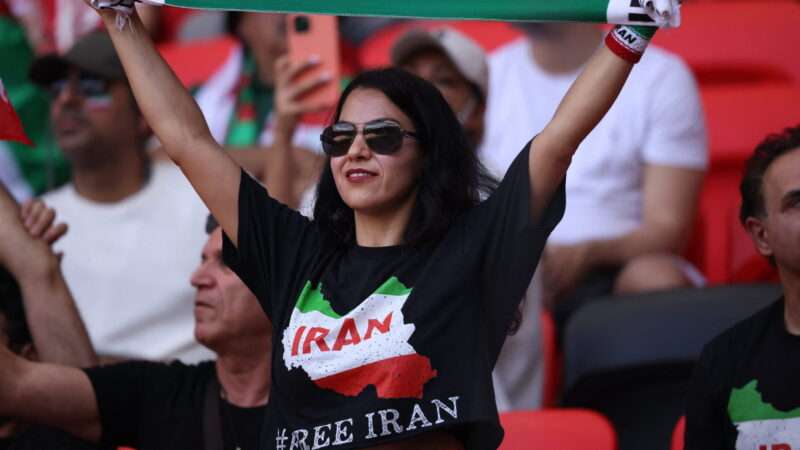
Tuesday's World Cup match between the United States and Iran isn't the first time the two geopolitical adversaries will meet at the world's most-watched sporting event.
But it might be even more politically charged than the first, and the stakes on the field—the only thing that will actually reach a resolution on Tuesday—are undeniably higher.
When the U.S. and Iran collided at the 1998 World Cup in France, it was a big deal. That was less than two decades removed from the Iranian hostage crisis and the overthrow of the American-backed Shah. Diplomatic relations between the two countries were nonexistent, and the U.S. had imposed a trade embargo on Iran in 1995. The match included a carefully choreographed pre-game handshake between two teams—Iran's government refused to allow its players to walk towards the U.S., so the Americans walked to the Iranian side of the field.
As Reason's Fiona Harrigan has written, these high-profile sporting events can highlight the difference between how governments and regular people interact. The 1998 Iran-U.S. game was a prime example of the ideals that underpin international sporting events like the Olympics and the World Cup—that meeting on the soccer pitch can help ease tensions and remind everyone involved that national pride is most enjoyable when the risk of bloodshed is minimal.
Also, both national teams were pretty bad in 1998 and neither was expected to advance out of a group that included traditional powers Germany and Yugoslavia. Iran won the match, 2–1, but both teams were eliminated in the first round anyway.
Times have changed. That 1998 game happened before 9/11 and the U.S.' subsequent decision to invade and occupy two of Iran's neighbors. It was before President George W. Bush labeled Iran part of the "Axis of Evil." It was before Iranian efforts to build a nuclear bomb, and before America made and then abandoned a deal to temper Tehran's nuclear aspirations. It was before Iran and U.S.-ally Saudi Arabia launched an awful proxy war in Yemen, with America feeding weapons into the conflict. It was before Iran was helping Russia with its invasion of Ukraine. It was before American-made social media platforms helped regular Iranians expose how the country's government abuses women's rights and limits free speech, and before those same platforms were used to organize protests against the Iranian regime. It was before 24/7 news and the internet turned all of this into an ongoing spectacle.
Take, for example, what happened during Monday's pre-game press conference, when American captain Tyler Adams was asked by a member of Iran's media team about America's history of racial segregation. That would hardly have been worth mentioning in pre-game coverage in 1998. In 2022, it turned into a viral moment—in no small part because of how Adams deftly responded (the politicians on both sides could learn from this).
Today, in a press conference ahead of USMNT vs. Iran, an Iranian reporter questioned Tyler Adams' support of the Iranian people, and then asked the team's captain if he's comfortable representing the U.S., given the way the country has treated Black people. ????️???????? pic.twitter.com/xjr0fGTWCi
— Men in Blazers (@MenInBlazers) November 28, 2022
Or consider the social media virtue signaling that the U.S. team's official Twitter account engaged in on Sunday, displaying Iran's flag without the Islamic Republic seal in the middle. That was a sign of support for protesters in Iran, some of whom have used the seal-less red, white, and green flag (which the country used before its 1979 revolution) as an emblem. Iranian officials were so outraged by the tweet that they asked FIFA to remove America from the World Cup.
So, yes, this is a bigger deal than the 1998 match. And that's before you even consider what's actually at stake on Tuesday. An American victory means the U.S. will progress to the next round of the World Cup, while Iran will be eliminated. If Iran wins or holds America to a tie, the Islamic Republic will advance at the Americans' expense. There is no scenario in which both teams play another game at the Qatar World Cup.
The heightened stakes make the game more exciting—and, frankly, more nerve-wracking—for the millions of us who will skip out on work this afternoon to watch it (sorry, KMW!).
But the game can also provide a bit of context for the real-world conflict between Iran and America. Unlike on the field in Doha, the multifaceted and complex real-world conflicts between the two countries won't have a tidy resolution, and shouldn't be governed by zero-sum thinking. Geopolitics isn't a game, after all, even if it is frequently mistaken for one.
Probably the most enduring image from the 1998 Iran-U.S. match is the Iranian players gifting white roses to the Americans before the game—a literal peace offering between countries that had no formal diplomatic relations.
It is unlikely that today's match will include a similar exercise. Unfortunately, that's not because relations between the two countries have improved in the past 24 years.
The soccer teams have gotten better since 1998. Now, it's time for American and Iranian leaders to follow suit.
The post Today's Iran-U.S. World Cup Match Is Even More Politically Fraught Than Famous 1998 Meeting appeared first on Reason.com.







